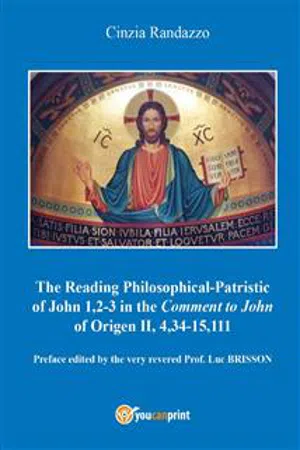
eBook - ePub
Reading philosophical-patristic of John 1,2-3 in the comment to John of Origen II, 4,34-15,111
- English
- ePUB (mobile friendly)
- Available on iOS & Android
eBook - ePub
Reading philosophical-patristic of John 1,2-3 in the comment to John of Origen II, 4,34-15,111
About this book
In this contribution, the author deals with the Origenian Interpretation of John 1, 2-3.
From an analytical reading of the Commentary to John of Origen, the author illustrates the lines of continuity and discontinuity with Plotinian's philosophy.
Frequently asked questions
Yes, you can cancel anytime from the Subscription tab in your account settings on the Perlego website. Your subscription will stay active until the end of your current billing period. Learn how to cancel your subscription.
No, books cannot be downloaded as external files, such as PDFs, for use outside of Perlego. However, you can download books within the Perlego app for offline reading on mobile or tablet. Learn more here.
Perlego offers two plans: Essential and Complete
- Essential is ideal for learners and professionals who enjoy exploring a wide range of subjects. Access the Essential Library with 800,000+ trusted titles and best-sellers across business, personal growth, and the humanities. Includes unlimited reading time and Standard Read Aloud voice.
- Complete: Perfect for advanced learners and researchers needing full, unrestricted access. Unlock 1.4M+ books across hundreds of subjects, including academic and specialized titles. The Complete Plan also includes advanced features like Premium Read Aloud and Research Assistant.
We are an online textbook subscription service, where you can get access to an entire online library for less than the price of a single book per month. With over 1 million books across 1000+ topics, we’ve got you covered! Learn more here.
Look out for the read-aloud symbol on your next book to see if you can listen to it. The read-aloud tool reads text aloud for you, highlighting the text as it is being read. You can pause it, speed it up and slow it down. Learn more here.
Yes! You can use the Perlego app on both iOS or Android devices to read anytime, anywhere — even offline. Perfect for commutes or when you’re on the go.
Please note we cannot support devices running on iOS 13 and Android 7 or earlier. Learn more about using the app.
Please note we cannot support devices running on iOS 13 and Android 7 or earlier. Learn more about using the app.
Yes, you can access Reading philosophical-patristic of John 1,2-3 in the comment to John of Origen II, 4,34-15,111 by Cinzia Randazzo in PDF and/or ePUB format, as well as other popular books in Theology & Religion & Religion. We have over one million books available in our catalogue for you to explore.
Information

INDEX
PREFACE
INTRODUCTION
1.Explanation of the word Principle
2.Identity of the Verb
3.Mediation of the Verb
Bibliography essential
CINZIA RANDAZZO
The Reading Philosophical-Patristic of John 1,2-3 in the Comment to John of Origen II,4,34-15,111
Youcanprint Self-Publishing
Title | The Reading Philosophical-Patristic of John 1,2-3 in the Comment to John of Origen II, 4,34-15,111
Author | Cinzia Randazzo
ISBN | 9788892699113
© All rights reserved by the Author
No part of this book may
be reproduced without the
prior permission of the Author.
Youcanprint Self-Publishing
Via Roma, 73 – 73039 Tricase (LE) – Italy
www.youcanprint.it
Facebook: facebook.com/youcanprint.it
Twitter: twitter.com/youcanprintit
PREFACE
La polémique subsiste sur l’identité d’Origène. Fut-il le disciple de Plotin chez Ammonius (Saccas) à Alexandrie, celui que Porphyre aurait rencontré, ou s’agit-il d’un homonyme qu’il faut distinguer d’un Origène païen ? Il est difficile de le dire. Il n’en reste pas moins que le prologue de l’Évangile de Jean : « Au principe, il y avait le Verbe (Lógos) et le Verbe était tourné vers Dieu et le Verbe était Dieu. Il était au principe avec Dieu. Tout a été fait par lui et sans lui rien n’a été fait de ce qui a été fait. En lui, était la vie, et la vie était la lumière des hommes … Et le Verbe s’est fait chair et il a séjourné parmi, nous, et nous avons contemplé sa gloire, la gloire que, Fils unique, il tient de son Père.» fut commenté, dans un contexte plotinien, par Amélius, l’assistant de Plotin. Cette exégèse constituait aux yeux d’Eusèbe de Césarée (Prép. Évang. XI 18.26-19.1) la preuve que Platon s’était inspiré des «Sages hébreux».
Origène se situe dans ce courant d’interprétation, en établissant un parallèle entre ce texte et la structure de la pensée de Plotin. L’Intellect indissociable de l’Intelligible, et qui, de ce fait, est le véritable Logos émanant de l’Un quelquefois qualifié de père de l’Intellect (Enn. II 9 [33] 2, 3 ; V 8 [31] 1, 1 ; VI 8 [39] 14, 37) lequel est à son tour qualifié de père de l’Âme (Enn. I 6 [1] 8, 21 ; II 9 [33] 16, 7 ; V I [10 1, 1). On retrouve ainsi la figure de la Trinité chrétienne. L’un est le Père de l’Intellect, le Logos, et donc de l’Intelligible qui peut être considéré comme son Fils. Cela dit, les Formes que contient l’Intellect se retrouvent dans l’Âme avec le statut de ces lógoi qui vont permettre la constitution du monde sensible ; de ce fait l’Âme es...
Table of contents
- The Reading Philosophical-Patristic of John 1,2-3 in the Comment to John of Origen II,4,34-15,111
- Indice
- Frontespizio
- Copyright
- Preface
- Introduction
- Bibliography essential